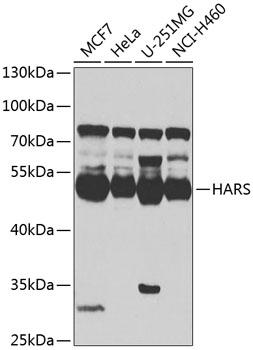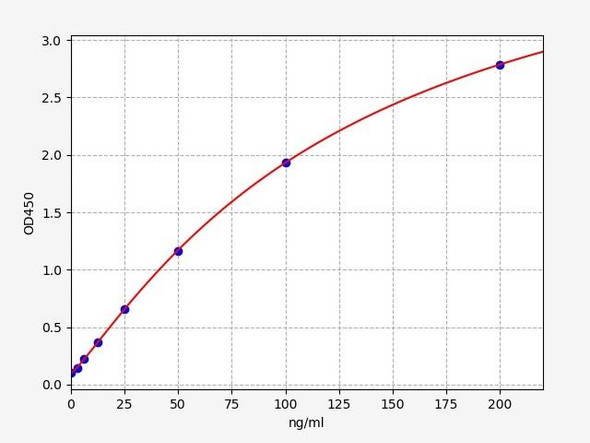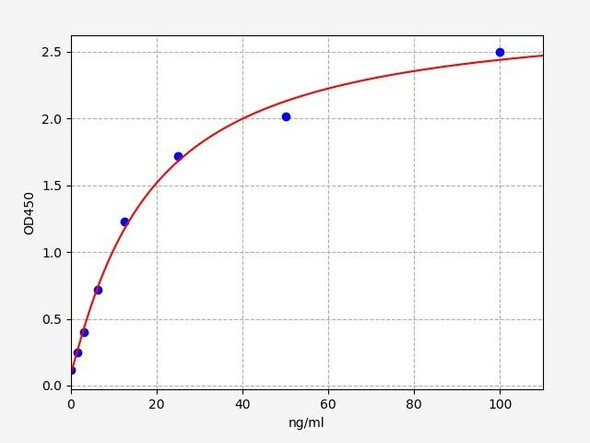Anti-HARS Antibody (CAB7899)
- SKU:
- CAB7899
- Product Type:
- Antibody
- Reactivity:
- Human
- Mouse
- Host Species:
- Rabbit
- Isotype:
- IgG
- Antibody Type:
- Polyclonal Antibody
- Research Area:
- Metabolism
Frequently bought together:
Description
| Antibody Name: | Anti-HARS Antibody |
| Antibody SKU: | CAB7899 |
| Antibody Size: | 20uL, 50uL, 100uL |
| Application: | WB |
| Reactivity: | Human, Mouse |
| Host Species: | Rabbit |
| Immunogen: | Recombinant fusion protein containing a sequence corresponding to amino acids 1-180 of human HARS (NP_002100.2). |
| Application: | WB |
| Recommended Dilution: | WB 1:500 - 1:2000 |
| Reactivity: | Human, Mouse |
| Positive Samples: | MCF7, HeLa, U-251MG, NCI-H460 |
| Immunogen: | Recombinant fusion protein containing a sequence corresponding to amino acids 1-180 of human HARS (NP_002100.2). |
| Purification Method: | Affinity purification |
| Storage Buffer: | Store at -20'C. Avoid freeze / thaw cycles. Buffer: PBS with 0.02% sodium azide, 50% glycerol, pH7.3. |
| Isotype: | IgG |
| Sequence: | MAER AALE ELVK LQGE RVRG LKQQ KASA ELIE EEVA KLLK LKAQ LGPD ESKQ KFVL KTPK GTRD YSPR QMAV REKV FDVI IRCF KRHG AEVI DTPV FELK ETLM GKYG EDSK LIYD LKDQ GGEL LSLR YDLT VPFA RYLA MNKL TNIK RYHI AKVY RRDN PAMT RGRY REFY QCDF DIAG |
| Gene ID: | 3035 |
| Uniprot: | P12081 |
| Cellular Location: | Cytoplasm |
| Calculated MW: | 50kDa/52kDa/54kDa/57kDa |
| Observed MW: | 57kDa |
| Synonyms: | HARS, CMT2W, HRS, USH3B |
| Background: | Aminoacyl-tRNA synthetases are a class of enzymes that charge tRNAs with their cognate amino acids. The protein encoded by this gene is a cytoplasmic enzyme which belongs to the class II family of aminoacyl-tRNA synthetases. The enzyme is responsible for the synthesis of histidyl-transfer RNA, which is essential for the incorporation of histidine into proteins. The gene is located in a head-to-head orientation with HARSL on chromosome five, where the homologous genes share a bidirectional promoter. The gene product is a frequent target of autoantibodies in the human autoimmune disease polymyositis/dermatomyositis. Several transcript variants encoding different isoforms have been found for this gene. |
| UniProt Protein Function: | HARS: Defects in HARS are a cause of Usher syndrome type 3B (USH3B). USH3B is a syndrome characterized by progressive vision and hearing loss during early childhood. Some patients have the so-called 'Charles Bonnet syndrome,' involving decreased visual acuity and vivid visual hallucinations. USH is a genetically heterogeneous condition characterized by the association of retinitis pigmentosa with sensorineural deafness. Age at onset and differences in auditory and vestibular function distinguish Usher syndrome type 1 (USH1), Usher syndrome type 2 (USH2) and Usher syndrome type 3 (USH3). USH3 is characterized by postlingual, progressive hearing loss, variable vestibular dysfunction, and onset of retinitis pigmentosa symptoms, including nyctalopia, constriction of the visual fields, and loss of central visual acuity, usually by the second decade of life. Belongs to the class-II aminoacyl-tRNA synthetase family. |
| UniProt Protein Details: | Protein type:EC 6.1.1.21; Translation; Ligase Chromosomal Location of Human Ortholog: 5q31.3 Cellular Component: cytoplasm; cytosol; mitochondrion Molecular Function:histidine-tRNA ligase activity Biological Process: histidyl-tRNA aminoacylation; mitochondrial translation; tRNA aminoacylation for protein translation Disease: Charcot-marie-tooth Disease, Axonal, Type 2w; Usher Syndrome, Type Iiib |
| NCBI Summary: | Aminoacyl-tRNA synthetases are a class of enzymes that charge tRNAs with their cognate amino acids. The protein encoded by this gene is a cytoplasmic enzyme which belongs to the class II family of aminoacyl-tRNA synthetases. The enzyme is responsible for the synthesis of histidyl-transfer RNA, which is essential for the incorporation of histidine into proteins. The gene is located in a head-to-head orientation with HARSL on chromosome five, where the homologous genes share a bidirectional promoter. The gene product is a frequent target of autoantibodies in the human autoimmune disease polymyositis/dermatomyositis. Several transcript variants encoding different isoforms have been found for this gene. [provided by RefSeq, Apr 2012] |
| UniProt Code: | P12081 |
| NCBI GenInfo Identifier: | 135123 |
| NCBI Gene ID: | 3035 |
| NCBI Accession: | P12081.2 |
| UniProt Secondary Accession: | P12081,B4DHQ1, B4DY73, D6REN6, J3KNE5, |
| UniProt Related Accession: | P12081 |
| Molecular Weight: | 54,847 Da |
| NCBI Full Name: | Histidine--tRNA ligase, cytoplasmic |
| NCBI Synonym Full Names: | histidyl-tRNA synthetase |
| NCBI Official Symbol: | HARS |
| NCBI Official Synonym Symbols: | HRS; CMT2W; USH3B |
| NCBI Protein Information: | histidine--tRNA ligase, cytoplasmic |
| UniProt Protein Name: | Histidine--tRNA ligase, cytoplasmic |
| UniProt Synonym Protein Names: | Histidyl-tRNA synthetase; HisRS |
| Protein Family: | Histidine--tRNA ligase |
| UniProt Gene Name: | HARS |
| UniProt Entry Name: | SYHC_HUMAN |







